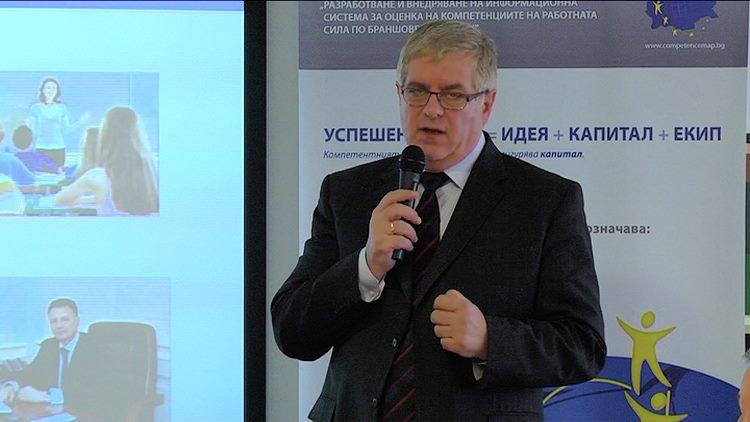The final conference on project BG05M9OP001-1.013-0001-C01 "Development of the National Competence Assessment System MyCompetence" was held today (23 October 2019) at MLSP. The forum was opened by the Deputy Minister of Labor and Social Policy Lazar Lazarov, and the achieved results were presented by Elka Dimitrov, Project Leader and Director of the Labor Market and Labor Mobility Policy Directorate at MLSP. The project was funded by the Operational Program on Human Resources Development and implemented by MLSP for the period 2017-2019, in partnership with the Bulgarian Industrial Association.
During today's forum, Tomcho Tomov, Head of the National Competence Assessment Center at BIA, presented the national competence assessment system MyCompetence. The system was developed by BIA during the period 2010-2014 under a project funded by OPRD, and now, under the MLSP project, MyCompetence has been upgraded with five new economic sectors. In addition, the sectoral competency models, developed and validated in the 2010-2014 period in the first 20 economic sectors covered by MyCompetence were updated in line with the dynamics in the development of the labor market. The BIA team also developed an electronic module for analyzing and assessing the needs and impact of training of the workforce in enterprises as part of the MyCompetence National Competence Assessment System.
"Jobs are changing. According to research, about 35-40% of the existing professions within 20 years will be replaced by brand new ones. There is probably no long-term profession that will remain unaffected by the digitalization and automation. The change now primarily involves clusters of activities within particular groups of professions. In 6 out of every 10 professions, about 40% of the activities are subject to immediate automation, " Tomcho Tomov said in his statement. He pointed out that, according to the European Training and Development Center, in the last few years, around 43% of EU workers have experienced changes in workplace technologies and 47% have experienced changes in the organization and working methods. According to the McKinney Institute, over the next 20 years, Europe will need 20 million highly skilled people.
"The gap between the demand for and supply of skills in the labor market is increasingly sharpening. The scissors in employment between high and low skilled labor will be increasingly opened. Within the companies themselves, the tendency to form a "core" and "periphery" is deepening, as two separate and differently important groups of personnel. The need for the so-called STEM skills (science, technology, engineering, math) and combinations of skills," Tomcho Tomov said.
In this context, MyCompetence is unique to Bulgaria and Europe, a publicly accessible, national electronic system that supports the development of human capital. The main goals of the system are: Increasing the capacity and adaptability of the workforce to the changing demands of the labor market; Balancing the demand and supply of skills in the labor market; Introducing modern innovative models in human resource management based on the competence approach; Building a sustainable link between education, training and the labor market; Adapting employment policies to the needs of the labor market.
According to a Deloitte study, the effects on businesses of implementing competency-based human resource management are to increase productivity, reduce recruitment costs, reduce turnover, increase job satisfaction, return on investment in training.
So far, www.mycompetence.bg has 2.5 million visitors and 45,000 active users (individuals and legal entities), including 21 universities and over 17,000 students. 26,000 have successfully completed e-learning courses and used competency assessment tools. Experts from 13 countries - UK, Germany, Israel, the Netherlands, Austria, Belgium, Italy, Spain, Portugal, Estonia, Czech Republic, Slovakia, Romania - have received positive feedback.
In addition to the development team, MyCompetence's organizational infrastructure includes 25 sectoral advisory boards with more than 300 participants (employers, managers, social partners, representatives of state and educational institutions), 280 pilot companies and 10 regional competence assessment centers.
The system contains competency profiles of 1300 key positions in the 25 economic sectors; National Competence Classifier covering 1000 competencies; Electronic catalog of competences by profession; Electronic dictionaries; Europass CV; electronic modules for developing a company competency model, for analyzing, auditing and evaluating the positions in the enterprise and for assessing the needs and the effect of the training of the personnel in the respective enterprise.
47 e-trainings, 14 international e-learning platforms, 20 electronic competency assessment tools, 360 degree feedback, self-assessment tests for suitability for a single key position can also be found in MyCompetence. A total of 2,600 respondents from the 280 pilot companies participated in the e-learning testing and competency assessment tools.
During the period 2016-2017 a special module called "Personal profile of the job seeker" was developed for the needs of the Employment Agency. The module is a digital profiling model integrated into the workflows of the Directorates of Labor (DBT), built as a WEB application accessible to all users through a standard Internet browser. It contains in-depth and structured information on work experience, skills, personal qualities and attitudes of job seekers. The module provides online access to assessment and development tools. The users of the module are: employees in DBT; unemployed / employed people, registered at the Labor Office, as well as people, whose registration has expired and use the information for personal purposes.
"Like any online based system, MyCompetence has a high potential for development," Tomcho Tomov emphazied. He shared that its integration with the E-Government, with the European Skills Classification ESCO, with the MLSP systems and models for forecasting the labor market and new skills needs, as well as with the Employment Agency databases (EURES) is forthcoming. Integration with the MES models and policies in the field of higher and vocational education is also needed, incl. dual training and the system for validation of non-formal knowledge and skills. According to Tomcho Tomov, one of the promising areas for development of MyCompetence is the increase of the sectors, professions and key positions, the number of e-learning and assessment tools developed, the modules related to supporting the human resources management in enterprises and more.






